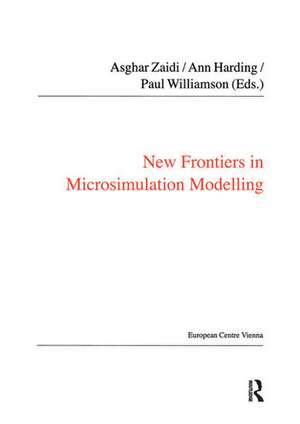New Frontiers in Microsimulation Modelling: Public Policy and Social Welfare
Autor Ann Hardingen Limba Engleză Hardback – 9 oct 2017
Preț: 255.29 lei
Preț vechi: 291.90 lei
-13% Nou
Puncte Express: 383
Preț estimativ în valută:
48.85€ • 51.11$ • 40.58£
48.85€ • 51.11$ • 40.58£
Carte tipărită la comandă
Livrare economică 03-17 aprilie
Preluare comenzi: 021 569.72.76
Specificații
ISBN-13: 9781138459038
ISBN-10: 1138459038
Pagini: 640
Dimensiuni: 170 x 240 mm
Greutate: 1.46 kg
Ediția:1
Editura: Taylor & Francis
Colecția Routledge
Seria Public Policy and Social Welfare
Locul publicării:Oxford, United Kingdom
ISBN-10: 1138459038
Pagini: 640
Dimensiuni: 170 x 240 mm
Greutate: 1.46 kg
Ediția:1
Editura: Taylor & Francis
Colecția Routledge
Seria Public Policy and Social Welfare
Locul publicării:Oxford, United Kingdom
Cuprins
Contents: Preface - Orcutt's vision 50 years on, Michael Wolfson; Introduction, Paul Williamson,Asghar Zaidi and Ann Harding; Part I Spatial Modelling: Moses: dynamic spatial microsimulation with demographic interactions, Mark Birkin, Belinda Wu and Phil Rees; Small area poverty estimates for Australia's Eastern seaboard in 2006, Robert Tanton, Justine Mcnamara, Ann Harding and Thomas Morrison; Microsimulation as a tool in spatial decision making: simulation of retail developments in a Dutch town, Eveline S. van Leeuwen, Graham P. Clarke and Piet Rietveld; Time and money in space: estimating household expenditure and time use at the small area level in Great Britain, Ben Anderson, Paola de Agostini, Selma Laidoudi, Antonia Weston and Ping Zong. Part II Work Incentives and Labour Supply: Work incentives, redistribution policies and the equity-efficiency trade off: evidence from Spain, José M. Labeaga, Xisco Oliver and Amedeo Spadaro; Microsimulating supply/demand interactions on a labour market: a prototype, Muriel Barlet, Didier Blanchet and Thomas Le Barbranchon; Policy swapping across countries using EUROMOD: the case of in-work benefits in Southern Europe, Francesco Figari; Behavioural microsimulation: labour supply and child care use responses in Australia and Norway, Guyonne Kalb and Thor O. Thoresen. Part III Demographic Issues, Social Security and Retirement Income: Fertility decisions - simulation in an agent-based model (IFSIM), Elisa Baroni, Matias Eklöf, Daniel Hallberg, Thomas Lindh and Jovan Zamac; Projecting pensions and age at retirement in France: some lessons from the Destinie I model, Didier Blanchet and Sylvie Le Minez; Rates of return in the Canada pension plan: sub-populations of special policy interest and preliminary after-tax results, Richard J. Morrison; Simulating employment careers in the lifepaths model: validation across multiple time scales, Geoff T. Rowe and Kevin D. Moore; Simulating earnings in dynamic microsimulation models, C
Notă biografică
Asghar Zaidi is Director of Research at the European Centre for Social Welfare Policy and Research, Vienna, Austria and Senior Economist in the Social Policy Division of the Dirctorate of Employment, Labour and Social Affairs, at the Organization for Economic Co-operation and Development (OECD), Paris, France. He has previously worked as an Economic Advisor to the British government's Department for Work and Pensions and he contributed to the government's dynamic microsimulation model, PENSIM_II. He is Vice President of the International Microsimulation Association. Ann Harding is Professor of Applied Economics and Social Policy and Director of National Centre for Social and Economic Modelling (NATSEM) at the UNiversity of Canberra, Australia. She is an internationally recognised expert in the fields of microsimulation modelling, income distribution and tax/transfer policy, with four published books in the field, and experience of working on major policy reviews in several Federal government departments. She is a Fellow of the Academy of Social Sciences and has been President of the International Microsimulation Association since 2003. Paul Willliamson is Senior Lecturer in Geography at the University of Liverpool, UK. He is the editor of the International Journal of Microsimulation.
Recenzii
'Overall, the contributions presented in this volume give a very good overview of the state-of-the-art in microsimulation modelling. The volume may be useful for at least two different tasks. Firstly, it could be a reference for those already working in the area of microsimulation who are searching for guidance towards specific topics. Secondly, it could be useful for those interested in building a microsimulation model, since the selection of papers provides a broad overview of the scope but also about the potential pitfalls associated with model building.' The Journal of Artificial Societies and Social Simulation
Descriere
In the past fifteen years, microsimulation models have become firmly established as vital tools for analysis of the distributional impact of changes in governmental programmes. With contributions from more than 60 international experts, this volume offers a comprehensive introduction to the state of microsimulation internationally, illustrating a wide range of new applications and approaches.








